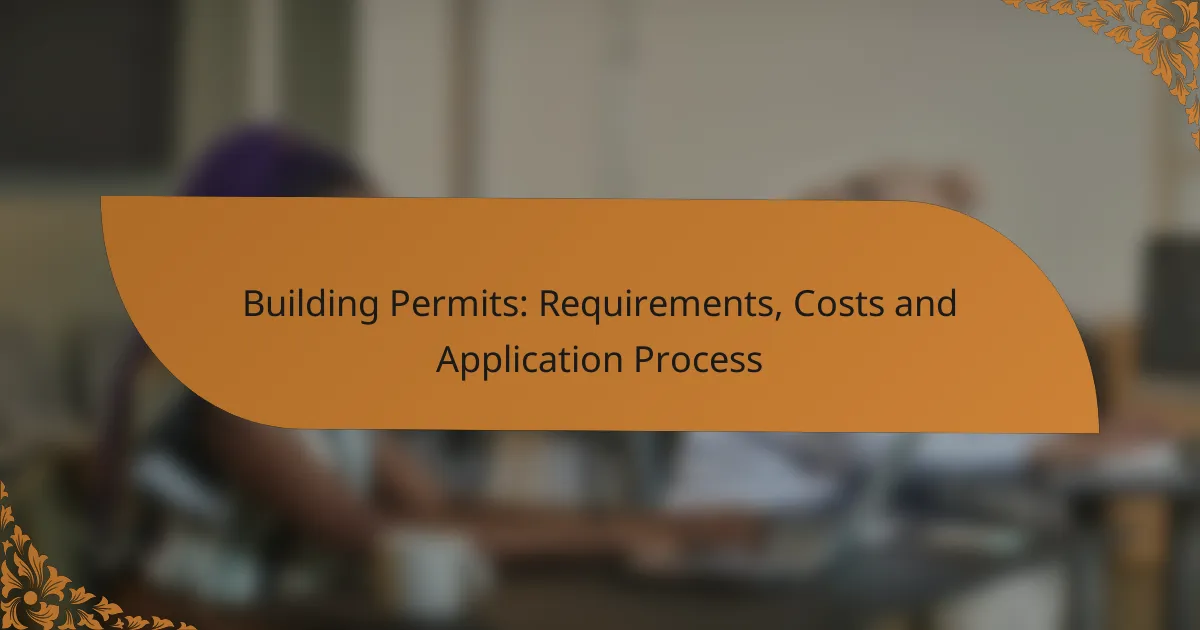Obtaining a building permit is a crucial step in any construction project, ensuring compliance with local regulations and safety standards. In California, this process involves adhering to zoning laws, building codes, and environmental assessments, along with submitting detailed plans and verifying property ownership. Costs can vary significantly based on project scope, while the application process typically includes submitting necessary documentation and paying relevant fees.
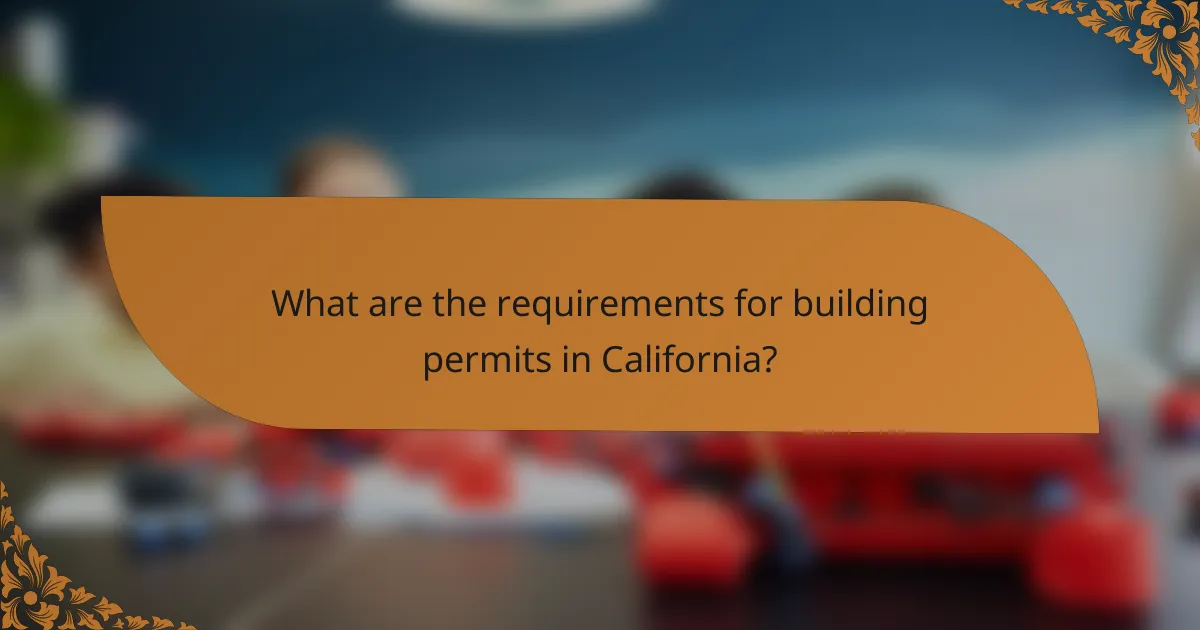
What are the requirements for building permits in California?
In California, obtaining a building permit requires compliance with local zoning regulations, building codes, environmental assessments, property ownership verification, and the submission of detailed construction plans. Each of these elements ensures that construction projects meet safety, legal, and environmental standards.
Local zoning regulations
Local zoning regulations dictate how land can be used and what types of structures can be built in specific areas. These rules vary by city and county, so it’s essential to check with your local planning department to understand the zoning classification of your property.
Common zoning considerations include setbacks, height restrictions, and land use designations. For example, residential zones may have different requirements compared to commercial zones, impacting the type of building you can construct.
Building codes compliance
Building codes in California set minimum safety and structural standards for construction projects. Compliance with these codes is mandatory and ensures that buildings are safe for occupancy and use.
It’s crucial to familiarize yourself with the California Building Code, which covers aspects such as structural integrity, fire safety, plumbing, and electrical systems. Hiring a licensed contractor who understands these codes can help streamline the permit application process.
Environmental impact assessments
Environmental impact assessments (EIAs) evaluate how a proposed construction project may affect the surrounding environment. In California, certain projects may require an EIA to identify potential impacts on air quality, water resources, and wildlife.
Depending on the project’s scope, you may need to prepare a detailed report or undergo a simpler review process. Engaging with environmental consultants early can help you navigate these requirements effectively.
Property ownership verification
To obtain a building permit, you must prove ownership of the property where the construction will occur. This typically involves providing documentation such as a title deed or property tax records.
If you are not the property owner, you will need written consent from the owner to proceed with the permit application. Ensuring this documentation is in order can prevent delays in the application process.
Construction plans submission
Submitting detailed construction plans is a critical step in the building permit application process. These plans should include architectural drawings, structural details, and specifications that comply with local codes and regulations.
It’s advisable to work with a licensed architect or designer to create these plans, as they must meet specific requirements set by the local building department. Incomplete or inaccurate plans can lead to delays or permit denials, so thoroughness is key.
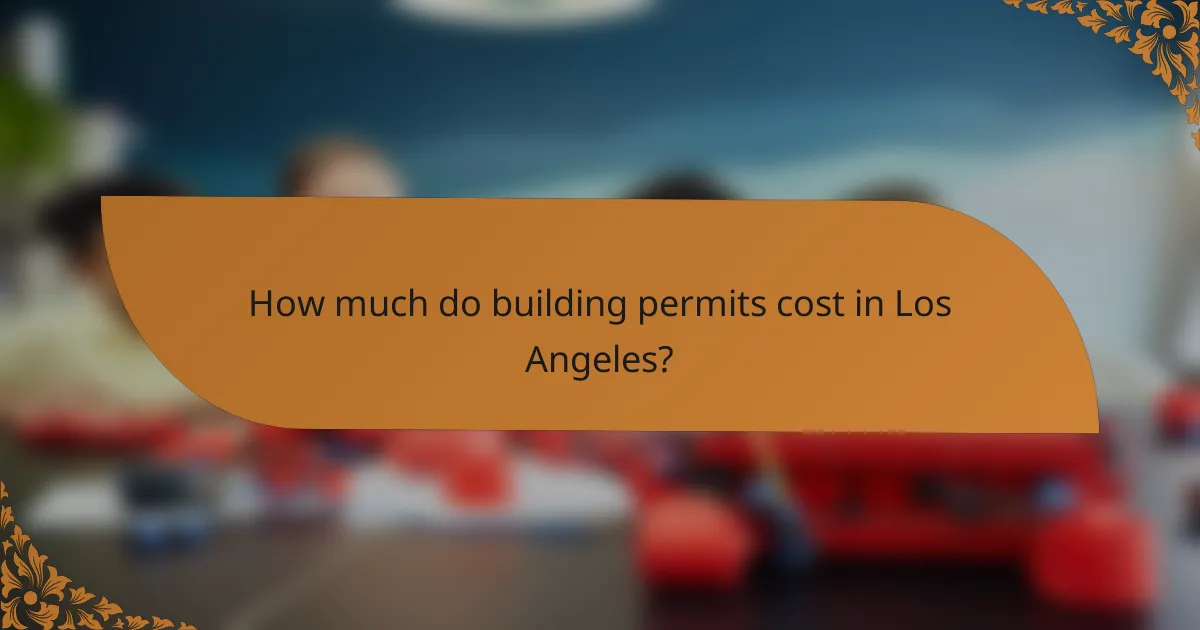
How much do building permits cost in Los Angeles?
Building permit costs in Los Angeles typically range from a few hundred to several thousand dollars, depending on the scope of the project. Factors such as the type of construction, square footage, and specific requirements can significantly influence the final fee.
Average permit fees
The average fees for building permits in Los Angeles can vary widely. For residential projects, costs often start around $500 and can exceed $2,000 for larger or more complex builds. Commercial permits may range from $1,000 to over $10,000, depending on the project’s scale and requirements.
Factors affecting costs
Other considerations include the need for additional permits for specialized work, such as electrical or plumbing installations, which can add to the overall cost. It’s advisable to consult with the Los Angeles Department of Building and Safety for precise estimates based on your specific project.
Additional inspection fees
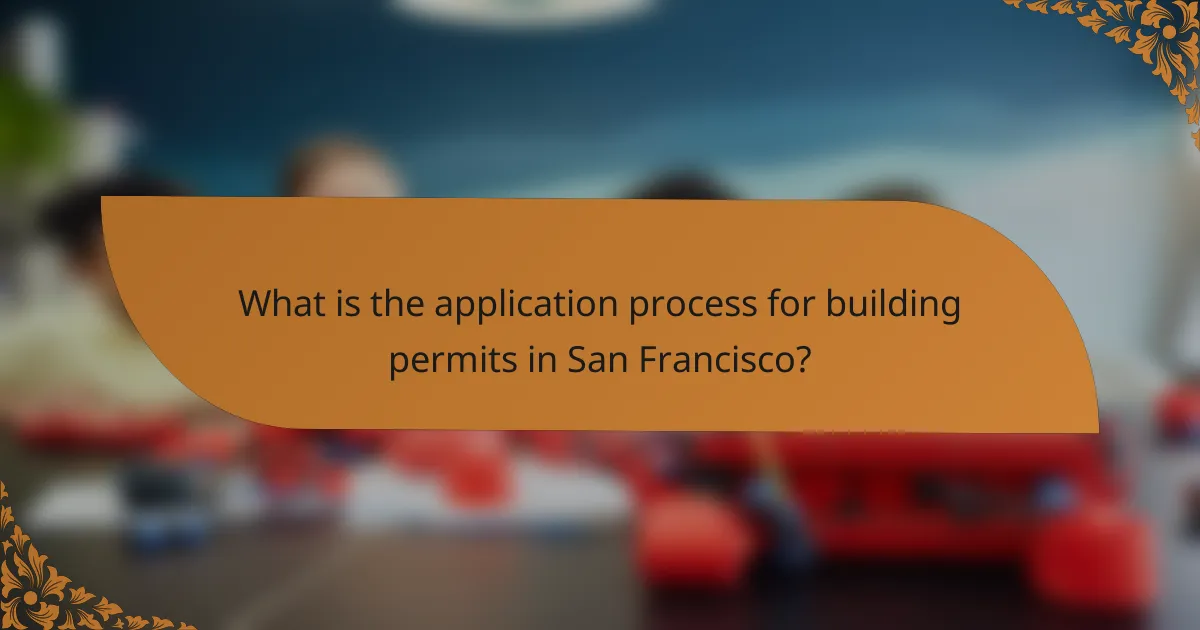
What is the application process for building permits in San Francisco?
The application process for building permits in San Francisco involves several key steps, including submitting an application, providing necessary documentation, and paying applicable fees. Understanding this process can help streamline your project and ensure compliance with local regulations.
Step-by-step application guide
To apply for a building permit in San Francisco, start by determining the type of permit you need based on your project. Common types include residential, commercial, and alteration permits. Next, complete the application form available on the San Francisco Planning Department’s website.
After submitting your application, it will undergo a review process that typically takes several weeks. Be prepared to address any comments or requests for additional information from the planning staff. Once approved, you will receive your building permit, allowing you to commence construction.
Online submission options
San Francisco offers online submission options for building permit applications through the Planning Department’s website. This platform allows you to fill out forms, upload documents, and track the status of your application conveniently.
Utilizing the online system can save time and reduce the need for in-person visits. Ensure you have all required documents ready for upload to avoid delays in processing your application.
Required documentation
When applying for a building permit in San Francisco, you must provide specific documentation to support your application. This typically includes site plans, construction drawings, and any necessary environmental review documents.
Additionally, you may need to submit proof of ownership or authorization from the property owner if you are not the owner. Be sure to check the San Francisco Planning Department’s website for a complete list of required documents tailored to your specific project type.
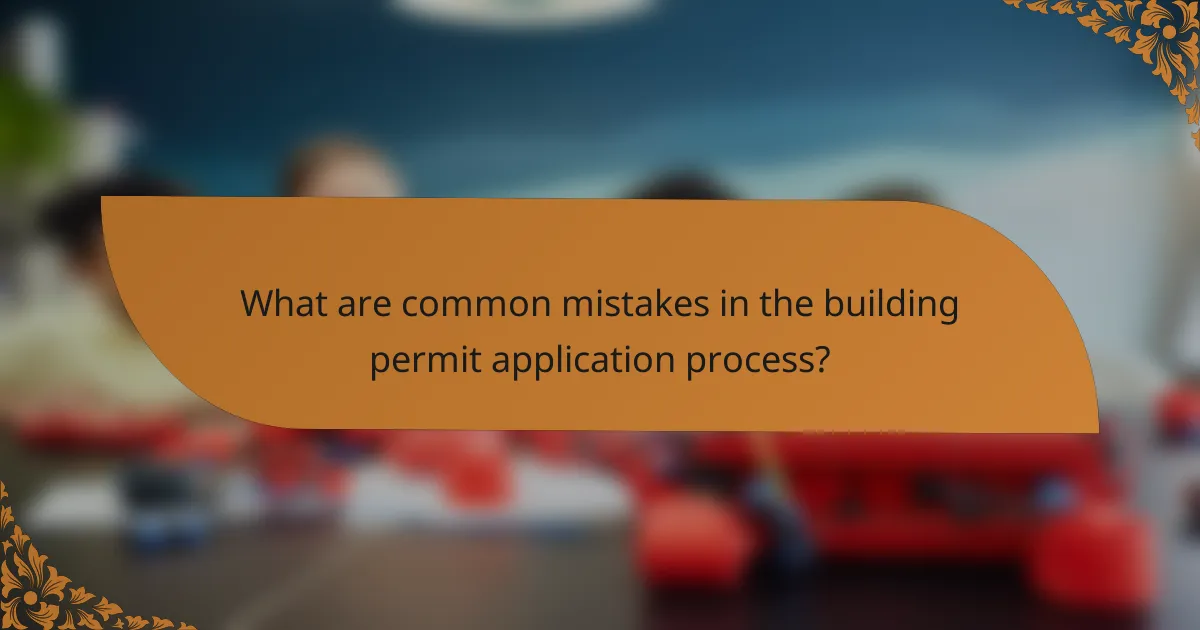
What are common mistakes in the building permit application process?
Common mistakes in the building permit application process can lead to delays and increased costs. Avoiding these pitfalls is crucial for a smooth approval process.
Incomplete applications
Submitting an incomplete application is a frequent error that can halt the review process. Ensure all required forms, fees, and signatures are included before submission.
To avoid this mistake, create a checklist of all necessary components, such as site plans, project descriptions, and contractor information. Double-check your application against this list before sending it in.
Ignoring local regulations
Failing to adhere to local regulations can result in significant setbacks or even denial of your permit. Each municipality has specific zoning laws and building codes that must be followed.
Research local regulations thoroughly or consult with a local building department to understand requirements. This may include height restrictions, setback requirements, and materials allowed for construction.
Failure to provide necessary documentation
Not providing the necessary documentation can lead to delays in the application process. Essential documents may include engineering reports, environmental assessments, and proof of ownership.
Gather all required documentation early in the process. Consider organizing your documents in a digital format for easy access and submission, ensuring that everything is up to date and accurate.
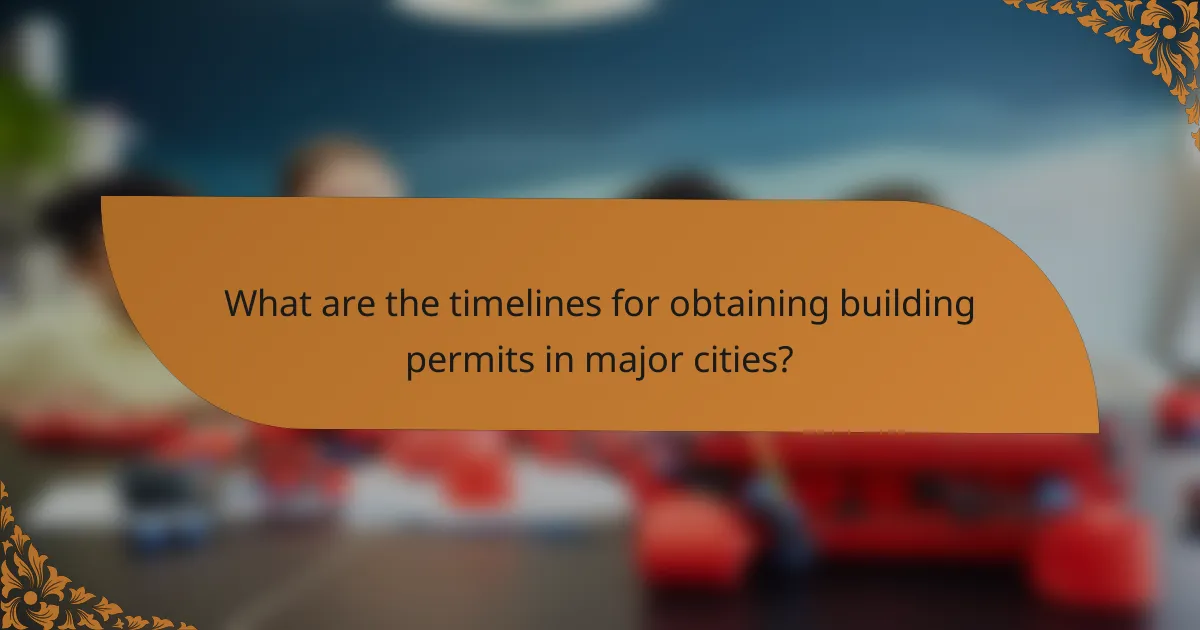
What are the timelines for obtaining building permits in major cities?
The timelines for obtaining building permits can vary significantly by city, often ranging from a few weeks to several months. Factors influencing these timelines include the complexity of the project, local regulations, and the efficiency of the permitting office.
Typical Timelines
In major cities like New York, Los Angeles, and Chicago, the average time to secure a building permit can range from 30 to 90 days. Simpler projects may be approved more quickly, while larger developments often face longer wait times due to additional reviews and public hearings.
Factors Affecting Timelines
Several factors can impact the duration of the permitting process. The type of construction, the completeness of the application, and the current workload of the permitting office all play crucial roles. Projects in densely populated areas may also encounter delays due to increased scrutiny and community input.
Tips for Expediting the Process
To help speed up the building permit process, ensure that your application is complete and includes all required documentation. Engaging with local officials early can clarify requirements and expectations. Additionally, consider hiring a professional familiar with local regulations to assist with the application.
